Pandora | Interview | New York City’s Mysterious Lost & Found Hard Rock / Protopunk Masterpiece From 1974
New York City’s mysterious lost and found hard rock / protopunk-metal masterpiece from 1974 — Pandora echoed of stardom with dynamic rhythms, fuzz-drenched guitar dexterity, and flamboyant, vigorous rockstar vocals.
A world class group with members of Plum Nelly, Black Widow, David Johansen, Twisted Sister, and The Demons. Ten songs engineered by Joe Battaglia (Granicus) meticulously remastered by Audu Obaje.
“Primal screams fired from a canon”
Interview with Ric Prince (vocals) and Martin John Butler (guitar)
Would you like to talk a bit about your background ? Where and when did you grow up?
Ric Prince: Born in Queens, raised in Brooklyn. I grew up in very tough neighborhoods. When I was 5 we moved to the Bedford Stuyvesant section of Brooklyn. Bused to school. I remember having to stay on this side of the street. The other side had people with knives and guns. Stay away. We moved again. Life became about the streets and fighting and surviving to play again another day. I wasn’t tough, I just pretended. I was mostly an actor. A straight-A student in school without a lot of effort, I spent lots of time pretending to be tough.
Martin John Butler: I grew up in Brooklyn, although I was in London from 1-4 years old. On my first day of school I had turned five only two days earlier. The music teacher, Miss Starr had every new student line up in the auditorium, walk to the piano, she’d play a few notes and ask each student to sing them back to her. She called my mother and asked for permission for me to sing with the school chorus. So I began performing when I was five years old as a vocalist, doing shows as a soloist the next year. That experience exposed me to classic songs from musical theater and traditional holiday music. We traveled to other schools to perform, so I was doing gigs when I was six!
How did you first get interested in music? Who were your major influences?
Ric Prince: My mother was a singer and music lover, she introduced me to rock n roll at around the age of 3. Growing up I was intrigued by provocative and tragic figures in film and theater. Poets like Dylan and Poe frightened me. I loved to be frightened. Music for me was British Rock & Pop. American Rock & Roll. John Lennon, Davie Bowie, The Stooges. I was a closet lover of German and Russian Classical Composers as well. No one else liked that stuff.
Martin John Butler: On the streets of Brooklyn, music was everywhere, on transistor radios, coming out of open windows and cars coming by. The British invasion was in full gear. So of course, The Beatles and The Stones, The Animals, The Byrds, all played a big part in developing my sound. At that time, AM radio played a great variety of music, so I was just as thrilled by The Supremes, Sam & Dave, The Beach Boys, Elvis, Sam Cooke, and many others. My friend’s older sister was still playing records she liked from the 50’s, so I heard a lot of that too, but mainly Dion and the Belmonts and Little Richard caught my ear. My father was from Montana and listened to a lot of classic Country, some Cool Jazz, and Classical, so music was always on the turntable in our apartment. That got into my musical DNA, even though I was into other styles.
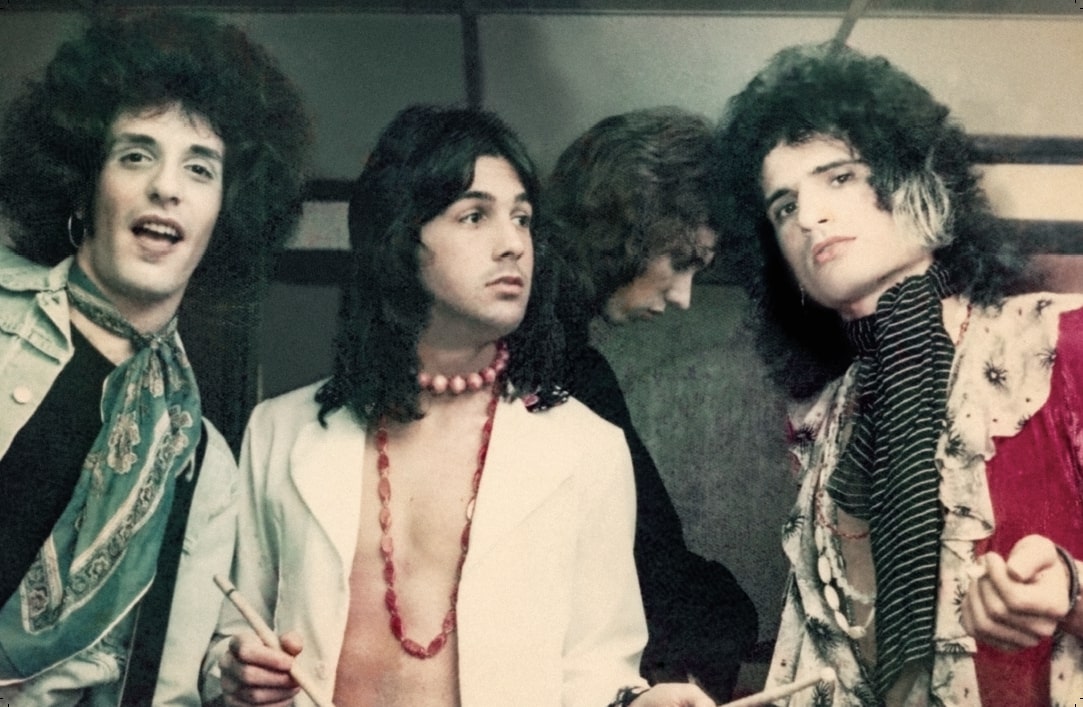
What bands were you a member of prior to Pandora?
Ric Prince: I played music with kids in my neighborhood from about age 12. Mostly in basements of friends houses. No formal training, except for some guitar lessons. My guitar teacher taught me how to chart music. I grew up fast and I was ready to make a mark. I hooked up with the popular neighborhood band ‘Creedmore State’. They were a killer Cream-like power trio. They had very long hair. They were teenagers, so was I. I was asked to join as their singer. We rehearsed in the basement of a friend’s house. We clicked, wrote songs and got ready to make it big.
I knew Nicky & Arnie Ungano from the legendary Ungano’s Nightclub on the upper westside of Manhattan. I presented Creedmore to the Ungano brothers. They liked what they heard, called me the next day, and signed on to become our manager.
Ungano’s was not only a concert room, but a watering hole for the biggest names in the rock music world. Music stars would drop by after a big show at a concert venue like Madison Square Garden to hang or jam there. It was the perfect storm, and we were in it…
In order for the record labels to hear us we became the club’s house band. We began to rehearse there. We needed to be ready. We would perform before audiences that included rock stars from all over the world and the biggest record label heads and execs. Musicians in bands as big as the Beatles and Zeppelin would go there to watch their favorite bands.
Creedmore State would share the stage, hang with, or open for an incredible array of artists: Rod Stewart & The Faces, Alice Cooper, Buddy Guy, Savoy Brown, Mountain, Black Sabbath, King Crimson, The Kinks, Fleetwood Mac, Deep Purple, Jimi Hendrix, Iggy Pop & The Stooges, B.B. King, Joe Cocker, Spooky Tooth, Bo Diddley Muddy Waters, The Allman Brothers, Free, Van Morrison, et cetera. It was star studded. In this little dark club. Unimaginable in this day and age. And this was my new home. What a blast.
Ahmet Ertegun (Atco, Atlantic Records) and Robert Stigwood (Cream, Bee Gees) made a special trip to see us and to personally offer us a deal. Also A&M Records, Columbia and finally Capitol Records signed us.
We had months of performing experience at Ungano’s and other venues so we had all the songs we needed to record the album. We changed our name to Plum Nelly and recorded the album ‘Deceptive Lines’ at Capitol East Studios with Ken Cooper as producer.
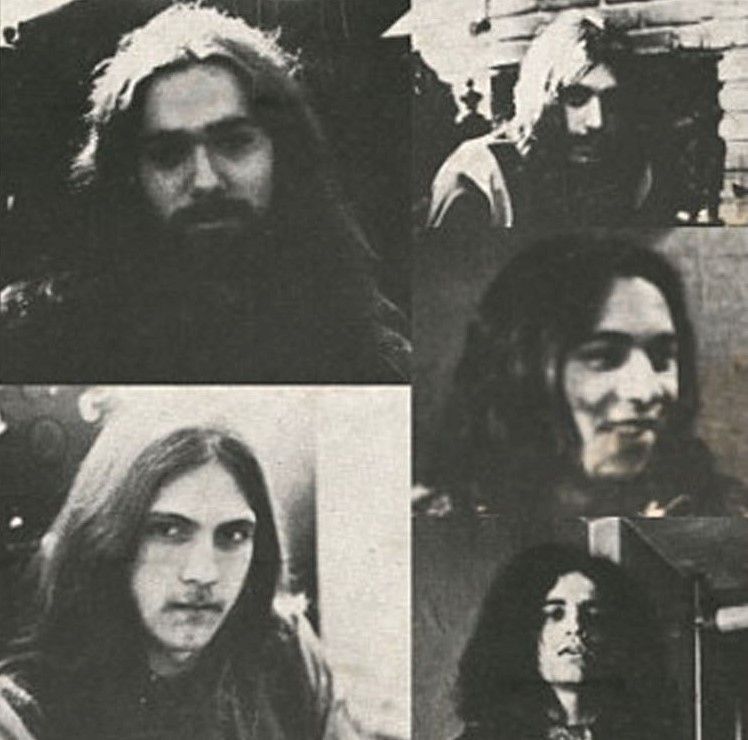
The songs were heavy, interesting with pounding drums and blues like guitar riffs throughout. Lyrically I was freed up to preach from the mountain top, be vulnerable, insecure and afraid. With the Sweet inspirations on board as background singers we rocked on. During the sessions we heard the takes back on a wall of speakers. It sounded great. Not knowing that it was recorded on a minimal amount of tracks. The sound of the vinyl was thin and flat. In the end we were disappointed. So it was misleading. We were kids, we didn’t know any better.
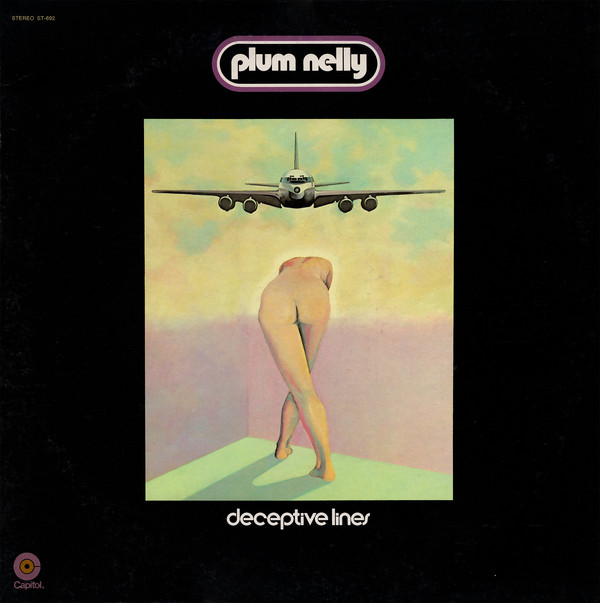
The album has since become a bit legendary among collectors and rightly so. Plum Nelly was lightning in a bottle. We subsequently were put on tour with Joe Walsh and The James Gang culminating in a performance at Carnegie Hall. I jumped into the audience off a high stage during a show at South Mountain Arena the night before Carnegie. Almost killed myself. It was a good warm up.
More bands prior to Pandora…
I went to live in England. I joined Black Widow. After I returned to America fresh from a triumphant tour of Northern Europe with Black Widow, I started a band with Mark Bell (Marky Ramone) and bassist Kenny Aaronson which didn’t last very long. We were offered a deal with Kama Sutra Records with Kenny Kerner and Richie Wise producers. Alcohol prevented that from moving forward. Onward!!
Martin John Butler: Before Pandora I had a band called Triton. While in Lincoln High school we played college gigs doing covers at some wild parties. I was barely sixteen then. We sold out the now historical Greenwich Village club, The Gaslight on Bleeker St., and won our high school battle of the bands with all original music I’d written.
During one summer I formed a band with friends and we earned a residency at a well known Brooklyn Blues and Jazz club in downtown Brooklyn called Dodgers Bar. For a young white guy to stand up and play Rock & Roll and Blues to a mostly black audience, I had to be good or I’d get my ass kicked. So I took it seriously and worked hard to gain my chops. I was tall and looked like I was over 18, and I knew how to stay on the down low, so everything was cool. That was a true professional experience. In fact, I made $85 a night there, which is more than $500 in today’s money!
I joined Pandora when I was 17, so I only had two bands previously. Still, I was actually a seasoned pro by then.
“The chemistry was instantaneous”

Can you elaborate the formation of Pandora? The band released ‘Pandora’ (Flexi, 9″) via Eva-Tone Soundsheets. How did that come about?
Ric Prince: Staten Island was a hub for great musicians. Staten Island guitarist John Peterford called me and we started to write songs and hang out on the Island. I made friends with some of the musicians out there, and played a few gigs. Along the way I met drummer Frankie LaRocka on the Staten Island Ferry. The ferry in those days was a place to hang out, meet girls and drink heavily. Frankie was one of those guys who was very approachable. We struck up a conversation about music and exchanged phone numbers.
I started to visit him at his house and listen to music. We had a lot in common. We both loved British rock. I would go to see him play with his band Fantasy. Playing gigs there and hanging with Frankie I got to meet people like Earl Slick (Bowie), Tommy Gunn (American Tears) who I eventually formed a band with, Kasim Sulton (Todd Rundgren), David Johanssen (Dolls) and Sandy Gennaro (Joan Jett) who all lived on Staten Island.
I had a bunch of songs that needed a band. Frankie recruited bass player John “Buzz” Verno and we started to form what would be Pandora. I procured a rehearsal space in Brooklyn to audition a guitar player and placed an ad in the Village Voice. Martin Butler shows up and off we go. He was a perfect fit. Motivated and ready to play. The chemistry was instantaneous. The bass and drums were like thunder and Martin’s guitar was like lightning and I was the Voice of God. Perfect.
Martin John Butler: Everyone found musicians through an ad in the Village Voice then, even superstars. When I met Rick, there was an instant alignment, he had an outstanding true R&R voice and was a brilliant lyricist. At the first Pandora rehearsal, it was obvious to all of us something special was happening. Rick had already done a major label album, so he’d already earned our respect. I was the youngest, but my playing spoke for itself and was the identifying sound of the band after Rick’s vocals, in the same way Jimmy Page, Keith Richard or Pete Townsend’s playing was to their band.
Frankie LaRocka and Buz Verno were from Staten Island, which was a hotbed of major talent for some reason. They were already world class players when we first met, and both went on to notable music careers after Pandora. While we were waiting on word from record companies after doing a big showcase at Max’s Kansas City, Frankie and Buz joined up with David Johansen, so Pandora was over. They did all his solo albums, world tours, etc. Frankie went on to work on albums by John Waite, Bryan Adams, Tom Petty and The Company of Wolves.
I went on to form The Demons, a first wave Punk/Pop group, playing at CBGB’s and Max’s regularly. We signed with Mercury Records. Our album was at number 1 in 11 states, a 180 day national tour was booked when our drummer died and our singer was put in jail for a long time on drug charges. So Mercury was forced to drop the band. I moved on to a new band and eventually settled into producing and writing music for radio and television, winning a couple of awards.
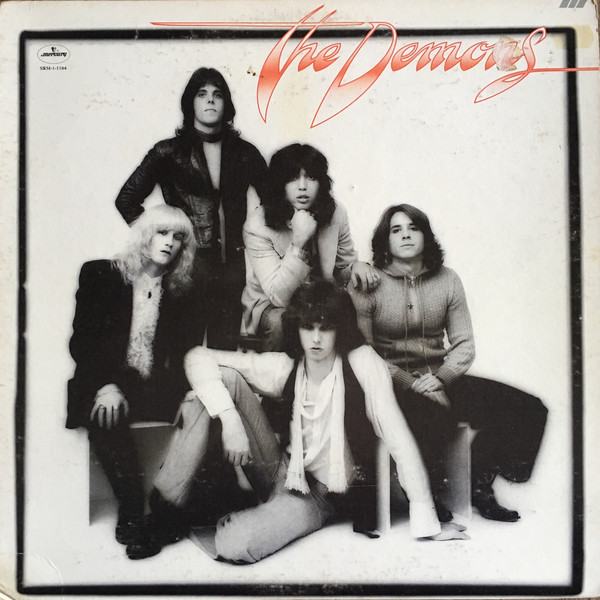
What influenced the band’s sound?
Ric Prince: Our chemistry was the biggest influence. At rehearsals, I honestly don’t remember ever warming up or playing cover material. We just started. I had pieces of paper everywhere with songs on them, and of course I would write on the spot as we rehearsed. I could hardly keep up with the immediacy and the seamless movement from song to song. Between rehearsals, Martin and I would meet at his mom’s house to create new ideas. It all made sense. Buzzy, Frankie and Myself were into British rock. Martin had a little more of an American rock feel. Best of all I now had a platform to exalt my special brand of psycho-drama. And create a theatre for the absurd. It worked.
Martin John Butler: Besides all the childhood influences I mentioned earlier, being from New York, we were well aware of the Velvet Underground and the New York Dolls. David Bowie was the biggest thing in the music business then and Roxy Music were going places no band had gone before. Having absorbed the British sound of The Beatles, Stones, The Who, Cream, Led Zeppelin, Traffic and others, Pandora wanted to create music that reached both that massive audience and the new Glam/Proto Punk audience. It wasn’t a calculated thing though, we naturally brought all those influences with us. We rarely spoke about it, we just played that way.
“For Pandora’s music to have survived as a testament to a great band that was lost in time to me is a minor miracle”
The band released ‘Pandora’ (Flexi, 9″) via Eva-Tone Soundsheets. How did that come about?
Ric Prince: I simply don’t know enough about the flexi 9″ or Eva-Tone sheets.
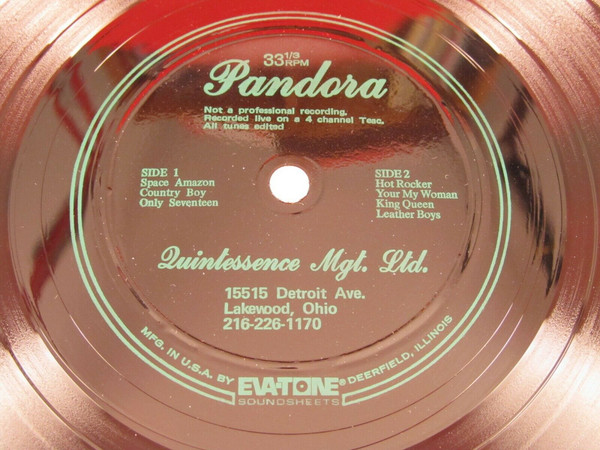
Martin John Butler: Vinyl can only hold so much music on a side before sound quality degrades, so the 7” disc was added as a bonus so fans could hear all of the music we’d recorded. Some of those tracks are slightly unfinished, but the core ideas and energy are there.
Why wasn’t Pandora material released in it’s time?
Ric Prince: The material was not released in it’s time because the ship hit an iceberg. We were bloated with ego and flying so high that we didn’t notice that our manager and false prophet Mr. George Freije of Quintessence Management fame had disappeared. Mouths agape we were left at the altar. No record deal. Someone turned the lights on and we all scattered. Buzz and Frank went off to Cherry Vanilla I think, Martin and I consoled each other for a while, he found The Demons and I joined Twisted Sister. All was forgotten. The tapes just sat in the drawer. I received a phone call in 2014 and was told of our legendary status. Hello!!!
Please share your recollections of the sessions.
Ric Prince: We were brought to a warehouse in Cleveland Ohio to record. We set up in the Granicus Band rehearsal room with Joe Battaglia manning the 4 track. It took just a few days to lay the songs down, and nobody missed a note. We were a machine. No mistakes. I remember that I was insecure about my ability on harmonica, but when I pulled it out for ‘King Queen’ and ‘You’re My Woman’, I felt like the King of The Blues. Joe pressed the record button and we did our set. We laid most of the songs down very quickly. One or two takes and that was it. He recorded us live. I remember us all turning to look at Frankie for the cue to start each song and everyone was laser focused. You can hear it on the tracks. One by one. Down the line. We did guitar overdubs, some harmonies and good night. I think it took two days. Unthinkable today.
What were the influences and inspirations for the songs recorded?
Ric Prince: The world the flesh and the devil.
What about the additional 7″ EP, ‘Don’t Pity’ Me and ‘Leather Boys’?
Ric Prince: Supreme Echo thought we should include it, in a special way, as a bonus.
‘Don’t Pity Me’ is just another masochistic narcissistic drone about a guy bragging that he doesn’t need any pity because his babe dumped him. He’s humiliated and in pain, but claims he doesn’t need her anyway. She can’t please him so she’s just a callous slut.
‘Leather Boys’, the song is loosely based on the controversy surrounding the gay bars on the west side of Manhattan. The police used to raid the gay bars regularly in those days and there was rioting in the streets. The police were violent. “It makes those blue boys wonder where we all went wrong” is a line from the song. I may have also been thinking about rock musicians using androgyny as a protest against normalcy. Glam rock queens, the disenfranchised etc.
The recordings were found by Granicus guitarist Al Pinell. Granicus drummer Joe Battaglia produced the live-to-four-track demo. Tell us more about the Granicus connection.
Ric Prince: Both Pandora and Granicus had the same manager, George Frieje. George thought it expedient to enlist drummer Joe Battaglia of Granicus as producer for the recording. After George disappeared, Pandora’s flexi’s were left behind in Granicus guitarist Al Pinell’s office drawer for 18 years as I understand it.
Martin John Butler: Pandora was just a memory when a Flexi disc that our manager made to promote us to record companies was found in a desk decades later. That began a long journey that eventually resulted in the album release.
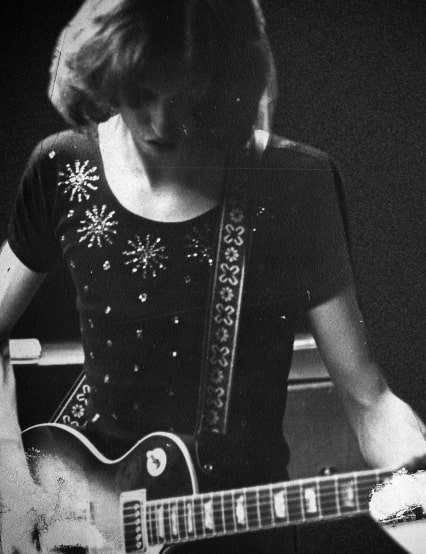
Our manager also managed a band from the Cleveland area called Granicus. We went there to record a demo in a big loft they rehearsed in. Joe Battaglia, their drummer did a great job of recording the group. Our manager was connected to Granicus, we didn’t know of them. Joe Battaglia was a very cool cat, but to be clear, he was not the “producer”, he engineered and mixed the demo, brilliantly I might add. Pandora produced the music. Every note, every riff, every phrase, every word was well rehearsed and we recorded it all live in one take over two days. I did a few lead guitar overdubs, and that was it.
Decades later, the demo was brought to the attention of indie label Arf! Arf! Records. Doug Sheppard, the man who wrote the CD liner notes was instrumental in getting it released. They tried to find us, but hit a dead end. So they issued a limited edition of our demo on CD, with a cartoon drawing of the band as the cover. David Fricke, the senior editor at Rolling Stone raved about it in one of his articles, but we didn’t learn of it until many years later. Pandora gained a cult following online and that inspired some record companies to inquire about a vinyl release. We chose Jason Flower at Supreme Echo because he had a lot of experience with vintage releases and was a great fan of the band.
“We rehearsed like madmen”
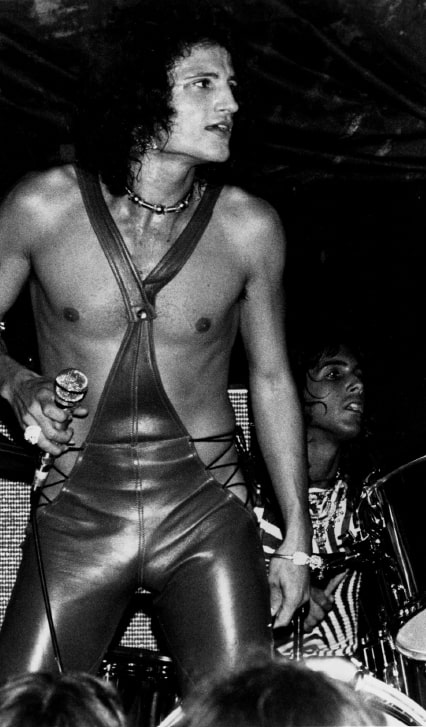
When I met Rick, he had already written some of what became the Pandora songs, it was up to me and the band to bring them to life. We then co-wrote a few tracks that created the album you hear today. I was half British myself, and Rick had spent time in London touring with a band, so the British influence was strong, but there was also an undercurrent of Hard Rock and Blues hidden between the lines.
We rehearsed like madmen, each member pushing the other to greater heights in the basement of a beauty parlor in Brooklyn. We only did a few shows before going to Cleveland to record, and then going back to do the big music business showcase at Max’s. We had such a natural synergy, we just sounded right together immediately. So the band itself was short lived. I was angry because I could see our band would have made it, but for Frankie and Buz, joining David Johansen seemed like a sure thing, and it was. The only mistake they made in my opinion was if we had stayed together and signed with a major label, they would have shared equally any money the band would make instead of being hired hands.
Looking back, what was the highlight of your time in the band? Which songs are you most proud of?
Ric Prince: Seeing the songs come to life. Having a smoking hot band to support my insane lyric. Pandora was another “lightning in a bottle” moment. Somehow each of us knew exactly what to do to make the songs work. Right from the start. I am grateful to have had that opportunity. I’m most proud of all the songs. But the song I listen to the most to this day is ‘Space Amazon’, it’s kind of timeless.
Where and when was your most memorable gig?
Ric Prince: The Max’s Kansas City showcase. George had rented upscale transportation to make us feel important. He booked 3 rooms at The Hilton. We paraded through the streets of Manhattan and made our presence known in the hotel lobby. Not exactly lounge lizards. People were aghast at our appearance.
I don’t recall the labels that were there at the show. George mentioned RCA, and Seymour Stein from Shire records among others. It’s a blur. The set at Max’s flew by in an instant, but I’m not sure that we were comfortable about how we were presented. It all seemed to happen so fast. After the set we were whisked back to The Hilton with an entourage of record people and “hangers on” for a champagne celebration.
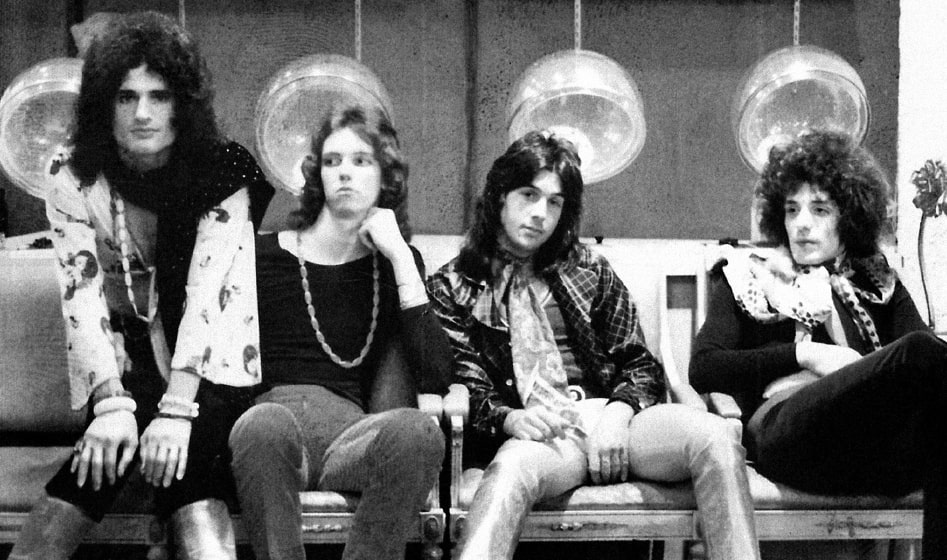
What currently occupies your life?
Ric Prince: Still writing music. Still singing. Still performing and recording.
Are you excited about the Supreme Echo release of your old material?
Ric Prince: Yes, very much excited!
Martin John Butler: I’m thrilled by the vinyl release. The remaster sounds great, the booklet, liner notes, bonus 7” record and photos are impeccably well done, thanks to Jason Flower’s tireless efforts. For Pandora’s music to have survived as a testament to a great band that was lost in time to me is a minor miracle. I’m grateful for all the music lovers and writers whose efforts brought it to light.
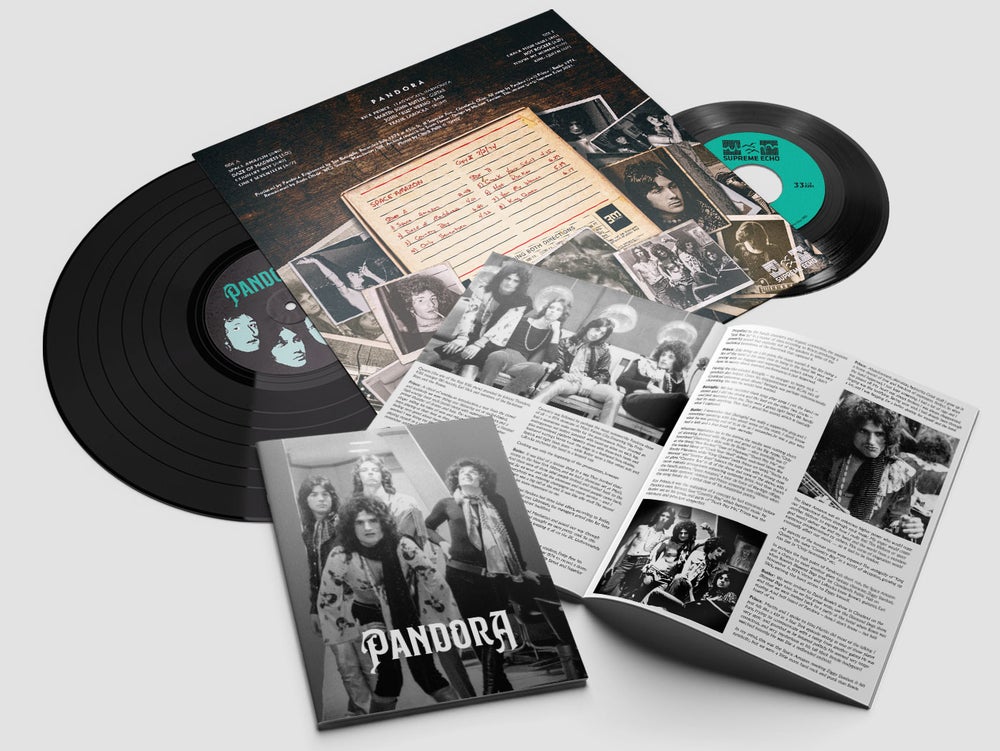
“No one else was doing what we were doing”
What can you tell me about the material that will appear on ‘Space Amazon’ ?
Ric Prince: No one else was doing what we were doing. In a way it was ahead of its time. It was encapsulated in hard rock and glam, but it was much more than that. It was Art Rock and Proto punk. Politically perverse. It was full of poetry and posturing. Guttural and rank. The band on full attack. Symphonic with discord. Zeppelin, T Rex and Bowie. Madness, narcissism, androgyny and macho angst. Exaltation and desperation. Supersized emotion coating the relentless musical energy. Primal screams fired from a canon. It was all there. Wasn’t it? One thing we were not was a New York City garage band.
Klemen Breznikar
Martin John Butler Official Website
Supreme Echo Facebook / Instagram / Bigcartel / Bandcamp

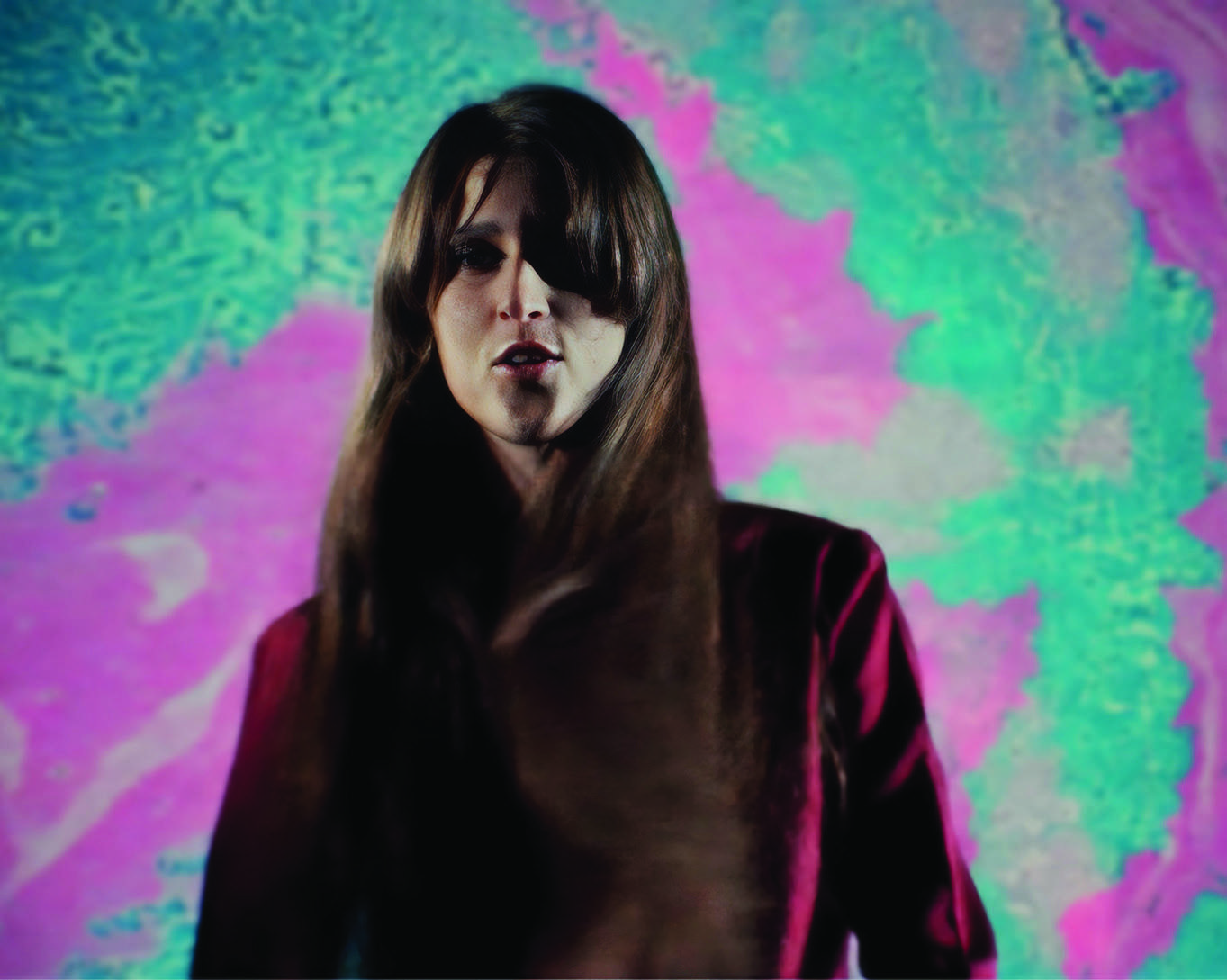
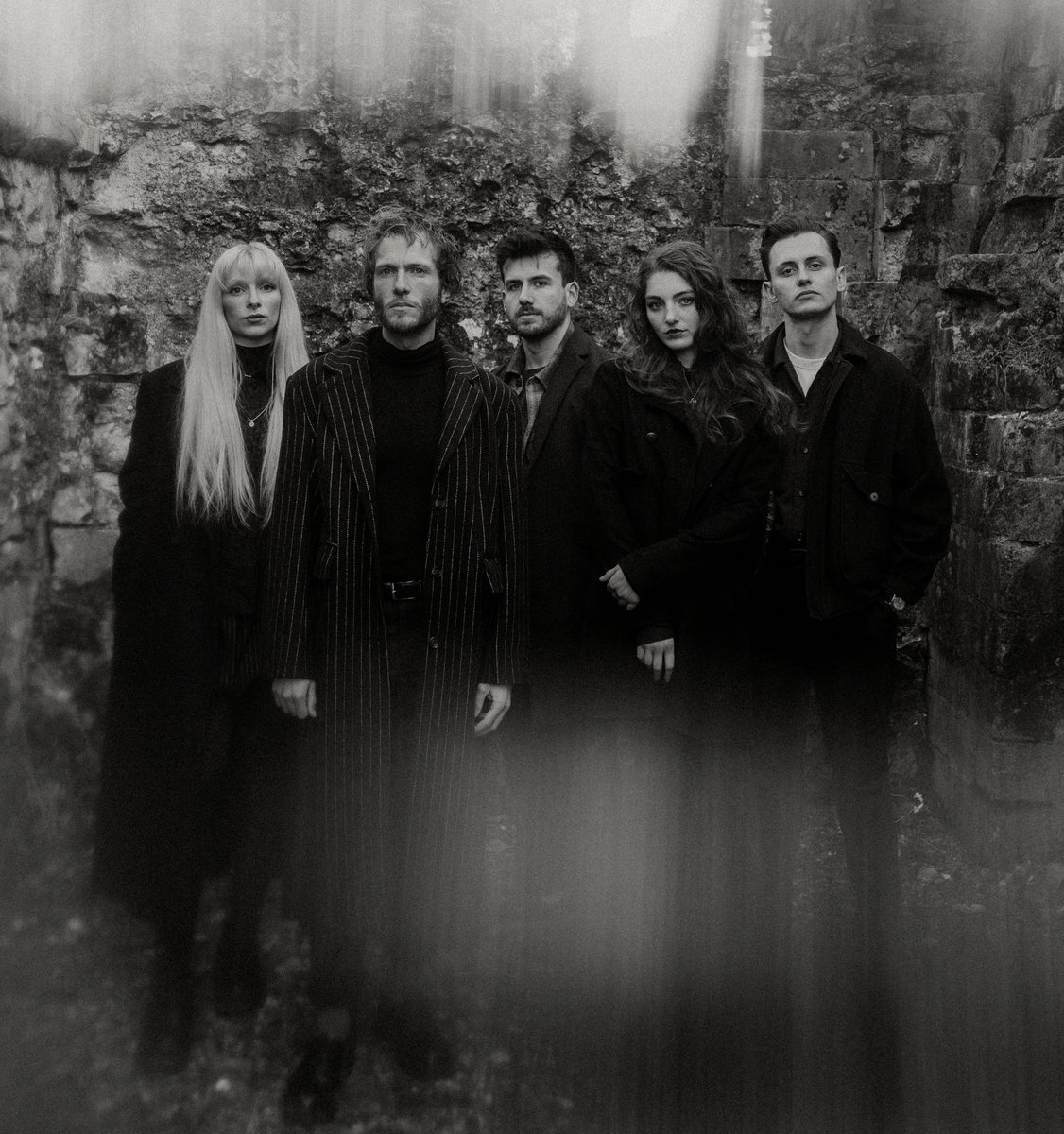
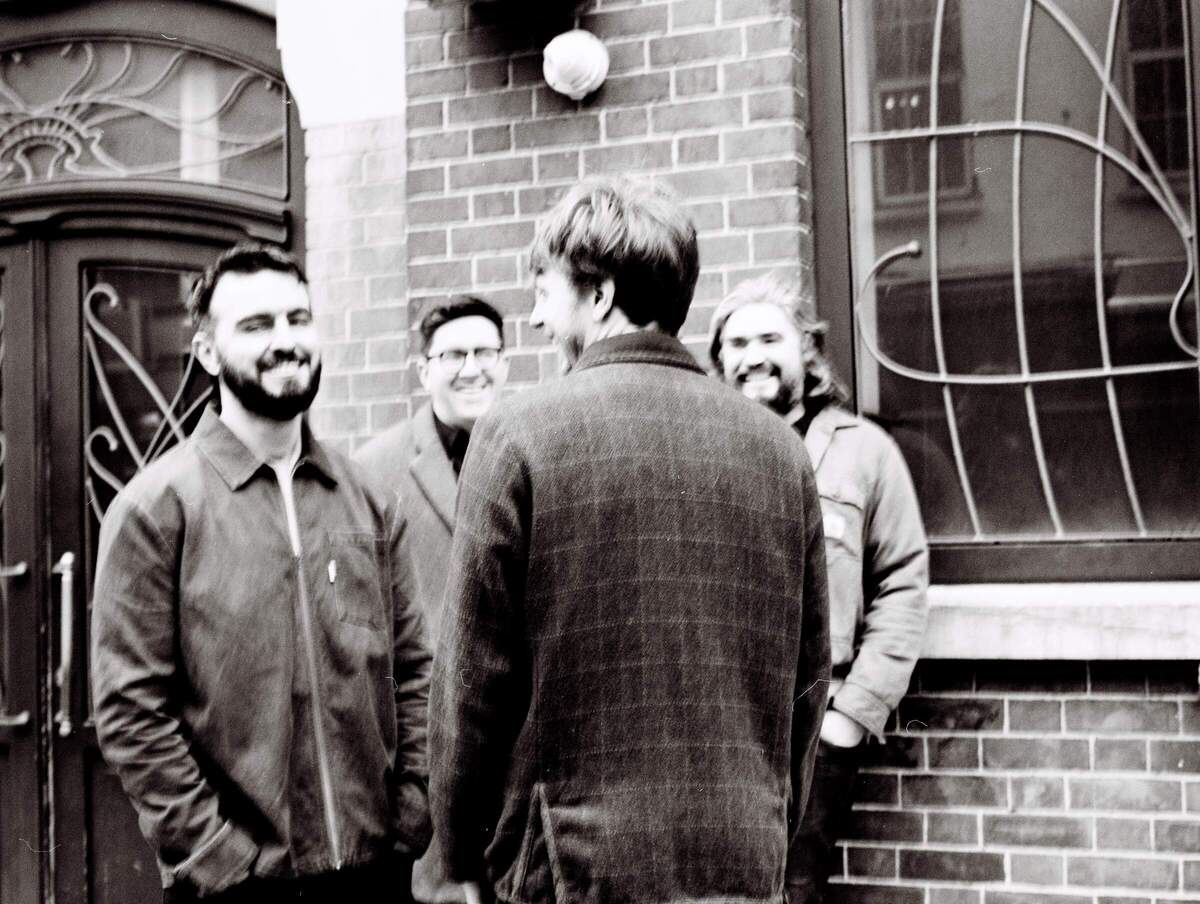
GREAT !!! THANKS FOR THE TIP & INTERVIEW.
Thanks again, great interview
I grabbed the arf-arf release years ago and couldn’t believe such a fab band could just disappear. It’s great to finally learn the story.